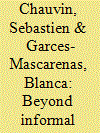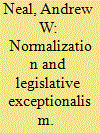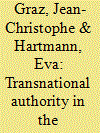|
|
|
Sort Order |
|
|
|
Items / Page
|
|
|
|
|
|
|
| Srl | Item |
| 1 |
ID:
118132


|
|
|
|
|
| Publication |
2012.
|
| Summary/Abstract |
Over the past decades, citizenship studies have explored in detail the various forms of social and civic integration achieved by otherwise illegal residents in contemporary immigration countries. While a great deal of analysis has tended to rest on a dichotomy between formal exclusion on the one hand and informal incorporation on the other, recent studies have begun questioning this dualistic model by examining the formal circuits of incorporation followed by unauthorized denizens at various geographical and institutional levels. Taking cues from this emerging line of research, this article makes three interconnected arguments. First, in contemporary liberal democracies, the rising tension between the illegal status of new immigrants and their limited but effective incorporation does not always pit formal law against informal practices, but is often located within law itself. Second, as a dynamic institutional nexus, "illegality" does not function as an absolute marker of illegitimacy, but rather as a handicap within a continuum of probationary citizenship. An incipient moral economy sees irregular migrants accumulating official and semiofficial proofs of presence, certificates of reliable conduct and other formal emblems of good citizenship, whether in the name of civic honor, in the hope of lesser deportability, or in view of future legalization. Third, such access to formal civic attributes is simultaneously being made increasingly difficult by the intensification of restrictions and controls from immigration, labor, and welfare authorities, thus confronting irregular migrants with the harsh dilemma of being framed as "more illegal" for the very documentary and economic features also assumed to improve their present and prospective civic deservingness.
|
|
|
|
|
|
|
|
|
|
|
|
|
|
|
|
| 2 |
ID:
118131


|
|
|
|
|
| Publication |
2012.
|
| Summary/Abstract |
Edward Said's praise of comics journalist Joe Sacco as a kind of "Marlow" (from Joseph Conrad's Heart of Darkness) is an analogy that reminds us of the contextualization of current affairs graphic novels in other media. While scholars and laypeople alike have praised serious comics and animated works for their capacity to get readers interested in "the horror, the horror" (iconic words of Heart of Darkness), the failure of such works to "translate" across diverse reading publics attests to the imperfections of conveying traumatic stories with drawings and words. Said's own earlier writing on Heart of Darkness helps to qualify his appraisal of Marlow-like narrations of the forgotten peoples of the world. In Culture and Imperialism (1993), Said explains that author Conrad (through Marlow) ingeniously accomplishes the tragic exposition of European imperialism in "two visions." First, Conrad acknowledges that his readers (Marlow's "listeners") are located "in a particular time and in a specific place," and second, Conrad permits Marlow to use "arabesque meditations" of ideas, and alternating blunt and evasive language, to capture the unrelenting journey of European imperial mastery (Said 1993:23).
|
|
|
|
|
|
|
|
|
|
|
|
|
|
|
|
| 3 |
ID:
118134


|
|
|
|
|
| Publication |
2012.
|
| Summary/Abstract |
Metaphoric descriptions of the world offer simple cognitive schemes to put things in their place, thereby offering keys to make reality easily interpretable. For centuries, the prevailing understanding of the political relied on an imaginary where borders were conceived like the lines of a coloring book, cutting political space into distinct state boxes, where citizens were defined congruously with the box of their state. The spatial knowledge inherent in this metaphor defined the dispositif of modernity-how to "map the world"-both in the socio-political and artistic domains. In the late nineteenth century, however, painting took a different understanding of spatiality and its representation. This article suggests that today-when the coloring book's imaginary is increasingly ill-fitted to describe socio-political realities-we could turn to art for a metaphor that would better capture late-modernity's understanding of borders and socio-political spaces. In sum, the article suggests turning to the paintings of Cézanne for inspiration.
|
|
|
|
|
|
|
|
|
|
|
|
|
|
|
|
| 4 |
ID:
118133


|
|
|
|
|
| Publication |
2012.
|
| Summary/Abstract |
This article analyzes counterterrorist lawmaking as an instance of security politics. It does so through archival parliamentary analysis of British counterterrorism legislation at three different times: in the wake of a perceived security emergency (2001); when the impact of an emergency is fading (2008); and when there is no emergency (2000). The findings show that over time, legislative exceptions and emergencies become normalized. By taking a parliamentary, legislative, and historical perspective, the article also challenges some of the assumptions of the exceptionalism debate.
|
|
|
|
|
|
|
|
|
|
|
|
|
|
|
|
| 5 |
ID:
118135


|
|
|
|
|
| Publication |
2012.
|
| Summary/Abstract |
This article examines the extent and limits of nonstate forms of authority in international relations. It analyzes how the information and communication technology (ICT) infrastructure for the tradability of services in a global knowledge-based economy relies on informal regulatory practices for the adjustment of ICT-related skills. By focusing on the challenge that highly volatile and short-lived cycles of demands for this type of knowledge pose for ensuring the right qualification of the labor force, the article explores how companies and associations provide training and certification programs as part of a growing market for educational services setting their own standards. The existing literature on non-conventional forms of authority in the global political economy has emphasized that the consent of actors, subject to informal rules and some form of state support, remains crucial for the effectiveness of those new forms of power. However, analyses based on a limited sample of actors tend toward a narrow understanding of the issues concerned and fail to fully explore the differentiated space in which nonstate authority is emerging. This article develops a three-dimensional analytical framework that brings together the scope of the issues involved, the range of nonstate actors concerned, and the spatial scope of their authority. The empirical findings highlight the limits of these new forms of nonstate authority and shed light on the role of the state and international governmental organizations in this new context.
|
|
|
|
|
|
|
|
|
|
|
|
|
|
|
|
|
|
|
|
|